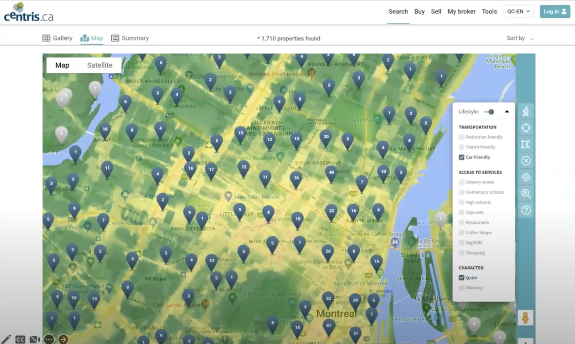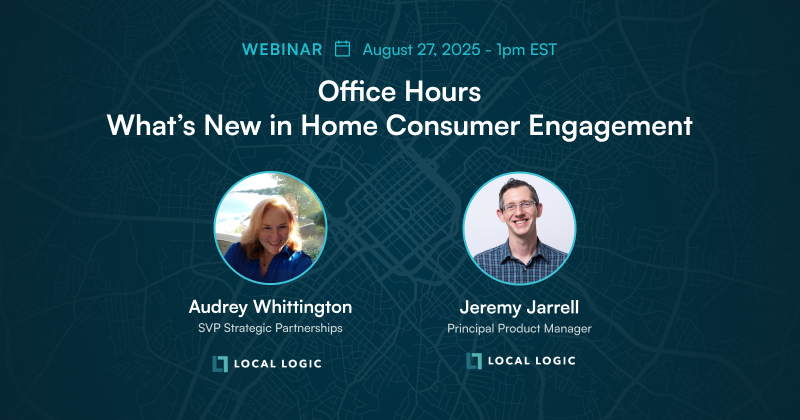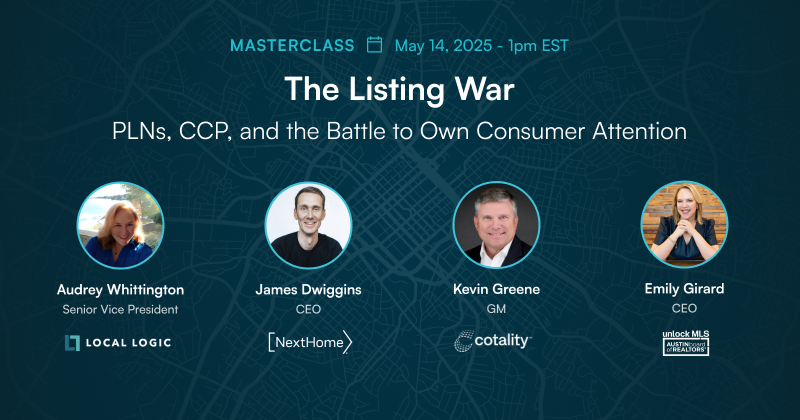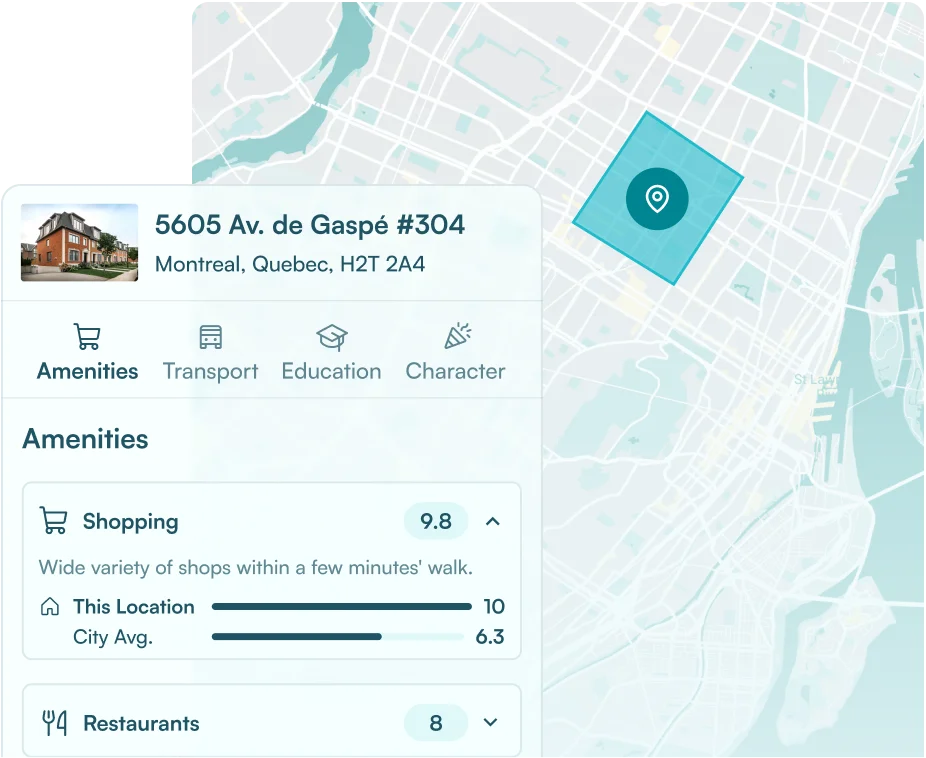Portals are shifting from being competition to valuable partners
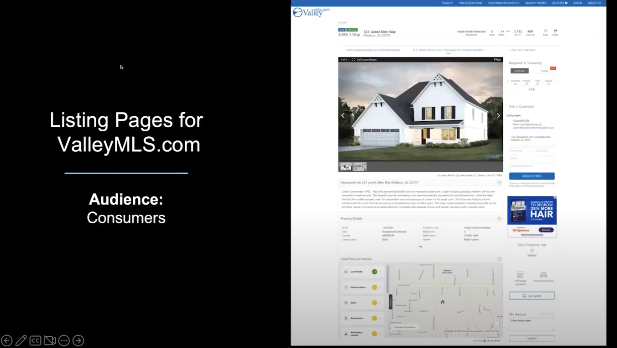
Tom Demos (TD), Constellation1:
Yeah. We’re one of the first on the MLS side of things. Everybody has brought up some things that really hit home. Marilyn, you brought up the fact that things have changed. The position has changed for the MLS, right? At first when these portals were created, the thought process was, oh, no, this is going to be a competition to my brokerage, to my agents, to whomever.
And that’s really not the case anymore. It’s a partnership. So they’re actually looking at it as a lead source. And really, we focus in on that with the MLS portals that we create. So, the systems that are created are really centralized to become a local hub. And like Audrey was saying, it’s about telling a story.
So, when we’re telling a story, the story is: buyer-seller comes on, they’re looking for a home. They can find obviously all the data, all the information. They get into a particular listing. When they get there, they can then see insights into that local area. Then they can see market information in that local area. Then they can also run searches with members that are in that local area. So they can really tie together that local feeling. It has a lot more emotional ties to it because it provides more value for that member. That’s the specialist. That’s there. That knows the area. That knows what’s going on.
In our case, we use location insights directly on the listing detail pages to make it easy for people as they’re going and looking at various listings to really be able to delve into it.
MLS is one to provide more resources. Consumers are pretty smart these days. They have access to all this technology. So, having that access for the agents or for the members themselves on here helps as well. Again, it provides more value. And it shows that they’re the experts and can answer questions and provide information also for the consumer side of things.
AW:
And I think what’s brilliant for Valley is that they do it on the consumer-facing side and through Paragon on the back side, so that it was very important to speak on behalf of Valley, that it was a synchronous experience, that their agents were never at a default, that an agent could say, my consumer found it, but I don’t know where to find it.
MW:
Eric said the same thing. I agree with you that if anything you want the agent to have more information than the consumer. But minimally, at least as much. Different ways for that to become kind of a natural part of the conversation.
Finding property listings based on location insights
MW:
I had a question for you for Valley specifically, and maybe it’s next-gen. The way you describe it is sort of, “I find the property and then I check the demographics or location insights.” Can I go the other way as well? Can I say I’m looking for a private, quiet street near a city and that it pulls up listings that fit within that or is it more listing-centric at the moment?
TD:
We focus on the listing center, but there is the next-gen that we’re looking at in regards to running those searches by those specific parameters to be able to have that information come about. Again, that’s all part of this growth process, right? Especially Valley, they’ve been very dynamic in the way that they’ve been growing this particular site.
Driving SEO value and increasing stickiness
TD:
They provide everything from market trend reports to SEO-friendly community pages to other features it will be launching. We have this new URL for life, which allows you to actually have a listing. Every property has its own URL, which either has MLS and public records data on it as well as insights. What that’s going to do is to enhance the amount of entry pages for potential buyers and sellers that are coming on as well as really provide a unique experience and that’s what they’re looking at.
MW:
And that actually helps with indexing on search engines as well.
TD:
Yeah. All of these are SEO-friendly entry points. Absolutely. And that’s really the basis behind it. And we see the greatest impact on insights is twofold. One is to enhance those entry pages where people are coming in and the other is stickiness. People want to stay on and be able to look at things and it gives them more information than they would get in general.
And that’s really the goal. It’s to have them stay on the site, make it to the local hub, run the searches, find things, find the members that they want to work with, and then most importantly, get it right into the members’ hands immediately without having to charge extra or get extra fees or all those types of things.
Acquiring more new users and growing your lead pipeline
MW:
Yeah. One of the things that we observed years back when we had Hitwise was that the traffic to MLS websites is very loyal and very rich, like the time-on-site. If someone’s on these sites, they’re very actively engaged. They seem to be further down the search process than some other people might be. But where they struggle sometimes is to attract new viewers, new users.
So this type of data could be one of those entry points where they’re like, “I’m looking for that, again, quiet home near the city” and they type in some natural language search on things like that. Over time, this is going to become more and more of a way to generate new users, I would guess — is that correct?
TD:
Yeah, that’s exactly it. You’re just providing more and more opportunities to have that access, which is outstanding obviously. If it were originally the thought process, if you’re going to find an MLS website, you’re pretty serious. You would think I’m a serious buyer or a seller. I’m not just randomly looking.
It’s great though if you can extend that reach. And again, it’s the same concept as we take with a brokerage or individuals where you really just want to have as many entry points as possible and make the consumer experience really one where you’re shown as a local specialist.
And that’s the differentiator here with these MLSs, and specifically, Valley has done an excellent job of that.
MW:
That’s awesome. And these kinds of tools are also available for broker websites and brokers?
TD:
They are. Yeah, we extend it all the way down. Absolutely. We use the same model for everything.
MW:
Are you hearing what our data said, Tom, that brokers are like, “Please, God help me wherever you can help me because it’s really expensive out there these days. And help my MLS be stronger because that’s a great partner that I love to work with.”
TD:
Yeah, actually. MLSs are working more and more together in regards to creating portals together as well as these individual portals because they’re seeing that there are better opportunities for lead generation directly to their members to keep those dollars and the cost of the sale low and really provide an opportunity to get more eyeballs to their listings, to their opportunities to sell.
MW:
Not to throw you a shout-out, but I will because you mentioned it. The MLS website partnership is being fueled by Constellation, correct?
TD:
That’s correct. Yeah. Nestfully.
MW:
So, they’re potentially going to lean in on some of these kinds of things too hopefully.
AW:
We are knee-deep in talks on that.
MW:
Not to give away anything.
Using location insights for broker brand building
MW:
What else do I want to ask you about? I just wanted to quickly ask you a broker question. I think there may be some brokers on the call. In a time where brokers are constricting their spending, why do you think they should lean in or something like this right now, Tom, and add something like this to their websites?
TD:
The choices are to build organically or use the light switch approach. I want leads. Let me turn it on. Let me turn it off. So, I keep paying and I’m not paying.
What really works with both on the brokerage on the MLS side is that if you’re really trying to build your brand and extend it out, the best thing you can do is continue to build on these tools (the market tools, the local insight tools, community pages), and make sure that you have as many calculators and unique items that make it easier for somebody to a. they to find you and b. when they do find you to be able to want to stay on and enjoy that experience and go, “There’s no reason for me to go anywhere else because I have everything I need here. And because of that, I’m going to come back more and more.”
MW:
And it feeds into what Eric was talking about — the not transactional, but the care that I’m here as a counselor, as your guide, as your spirit animal, or whatever words you want to use.
TD:
As your resource.
AW:
Yeah, I’d like to steal that one on the light switch because I was thinking, Tom, it reminds me of a thermostat, too. If you turn the thermostat off, it costs you more time and energy than to turn it down a little bit.
SEO dovetails into that perfectly. It’s less effective than maintaining and trying to keep a low level or medium level of being front and center with insights and important information.
TD:
Everybody hears SEO and they think, “Oh, I have to have content writers and I have to have these other elements.” It’s actually based on the structure of your website. You can really accentuate your SEO value just with natural tools. And then from there, enhance things as you have a blog or you have articles or have these other things but that shouldn’t be the basis.
There are so many tools out now from the software providers that allow you to really have everything at your disposal that now really will make that a natural experience of where your site will already be valued highly and it’s just how you’re going to grow it from there.
Lean in, rather than pull back
MW:
Makes a lot of sense for sure. One attitude that I always love to reinforce because I’ve heard it from the most successful brokers: In times like these, this is when they spend more money on things. They were smart to save in the good times when they had more cash flow than they knew what to do with.
AW:
And they get a better deal.
MW:
Come up the other end with a lot more market share than if you pull back now everyone’s pulling back. If you lean in while everyone’s pulling back, you’re going to come out the other end a lot stronger.
And same thing with MLS. MLSs are in most cases pretty capital comfortable, shall I say. They’ve got reserves. This is the time to do those kinds of things and make it happen because your brokers need you more than ever right now.
But again, coming out the other end, you’re going to have a lot more traffic. It’s going to be really helpful for everybody.
Let’s switch over to Ishay, CEO of Rental Beast. He’s our rental guru, and loves to talk very passionately about the topic. So, welcome Ishay.
Why should MLSs emphasize rentals?
Ishay Grinberg (IG), Rental Beast:
Thank you.
MW:
I want to start at the beginning before we get into location insights. But there is, as you’re well aware because you’re driving a lot of it, an expansion of the focus on rentals. Historically, MLS systems and MLSs, in general, were not the greatest at curating rich and deep, and usable rental inventory right.
They just didn’t do it as well as they could. So, why do you think MLS should be putting more emphasis on rentals these days?
IG:
Let me count the ways.
First of all, we spent a lot of time talking about the consumer not having more information than the real estate professional. In general, rental inventory rental data is a great example beyond insights. The vast majority of the rental inventory. If I’m a consumer and I want to find a place to live in the form of a rental property, for the most part, that information doesn’t reside inside the MLS system. So if I want to empower the members of the MLS to be at least at level par, if not the higher level, in gaining access to where can I place a prospective tenant, you need to have that rental data.
Second, we’re coming out of a period of four or five years where, as Eric mentioned, there’s been a real problem with supply on the for-sale side, and that is not a problem that is going away anytime soon.
I don’t have the statistics for Canada. I’m sure Eric has it. But in the U.S., we’re missing 4 million homes. Homebuilders are disincentivized in many respects to build new ones. You have a ton of demand. People really want to own a house. But because there is a lack of supply, the average cost to buy at home has continued to increase.
Now you have a rising interest rate environment and then, it’s become more unaffordable to get into a house. But people need a place to live. And when they can’t afford to buy or it’s harder for them to buy, they rent.
And I’m a perfect example of that, by the way. I wanted to buy. We made a decision to buy. We chose the neighborhood. It took me three years to buy that house and I rented throughout that period until I completed that purchase.
Which location insights are useful to consumers and realtors?
MW:
So I want to jump back to location insights overall. We just got an interesting question.
In your opinion, and I’ll start with you, Audrey, since you are the one that defined what a location insight is but what differentiates a useful/good location insight versus a not useful location site? I guess the question is really, what are the kinds of data that we’re finding that’s the most interesting to consumers and to realtors that are using it inside of systems?
AW:
Yeah, I’m not sure you can say that there is such a thing as an insight that isn’t useful. We’ve actually expanded our insights.
For example, I don’t drive an electric car, though actually, I wish I did, so I’m not looking for those car chargers. But many of my family members do care. I don’t have a dog, so I don’t care where the dog parks are, but most other people do.
There are various things that are important to me that may or may not be important to you. So I’m not sure there’s such a thing as a not useful insight. One of the things I do like about what we do, forgive the plug, is that we let you decide what’s a useful insight to you.
One of the reasons we have been doing well is because it’s interactive. You decide what’s a useful insight, not me. Traditionally the real estate industry has really been transitioning from, here’s a plethora of information, here’s a data dump. It’s a lot of information and it’s a lot to go through.
We are moving to a paradigm where it is a little easier to say, “I’d like to pick what’s important to me. I don’t want to have to suffer through a lot of other information and decide.” We are only expanding on what we provide so that we are not being pejorative in that decision-making.
Giving consumers easy access to actionable insights
MW:
And when you say you, do you mean the MLS or Local Logic?
AW:
Local Logic. Because, to Ishay’s point, what’s important to an MLS is different than what’s important to a broker, that’s different to a consumer, that’s different to an investor, that’s different to a renter. All of those people are focusing on different things. So there’s overlap.
MW:
Can I localize it? If there’s something that makes no sense in Quebec, or for whatever reason, the feature doesn’t exist. Can a local person turn it on or off?
AW:
Absolutely. One example of differentiation: in Canada, nursery schools are government-run. So we are able to show where nursery schools and preschools are. In the U.S., they’re private.
So there certainly are distinctions. There aren’t many actually. It’s actually one of the only ones where there’s a distinction between the two countries and data sets.
There are school ratings for Canada, there are school ratings for the U.S., it doesn’t matter.
IG:
I just wanted to double down on what Audrey said. MLSs, whether they realize it or they don’t, are data companies. They’re a treasure trove of data. On the Internet, in general, there are so many data points accessible to consumers, brokers, agents, property managers to appraisers.
Unless you take that data and harness it in a way that the simpleton like myself, just trying to do my job, can press a button and get an actionable insight that I can use — it’s almost useless. It’s great that you have it, but it’s useless.
And the reason we like Local Logic is exactly that. They distilled this down to a button. You can press a button, you can get exactly what you want to know about that particular neighborhood.
Empowering agents to become instant local experts
MW:
Gotcha. So we’re going to look at two different installations that Rental Beast is using. This is inside the MLS, right?
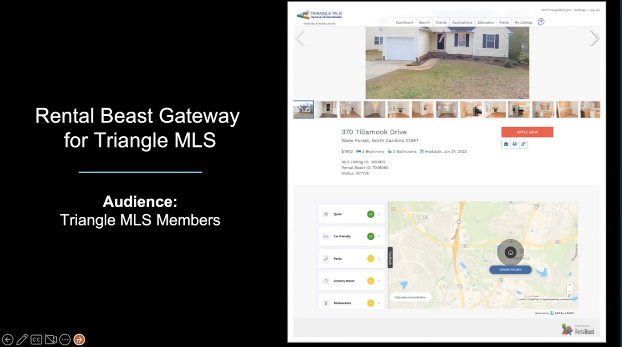
IG:
Yeah, this is inside the MLS. We had to shrink it to make it fit. And we wanted to highlight the Local Logic implementation.
I’ll just clear the distinction between sales and rentals in our view. Agents get a lot bolder when they work with renters. What I mean by that is I’m an agent. I have an office in downtown Montreal. Usually, I am comfortable selling homes in a five or ten-mile radius from that office. But if I’m working rentals, I’ll go to five or six neighborhoods all across. And I might not be as big of an expert.
We see it all the time, by the way, especially from the suburbs. You’re an agent in the suburbs. You know that the rentals are higher paid or higher rents downtown. You’ll drive half an hour, for a few thousand dollars in commission, but you may not know as much about the seaport area or whatever. So we want to really empower them to become kind of instant local experts. The Local Logic implementation on listing details helps us do that.
MW:
Rentals are becoming a lot more important to agents that have historically focused mainly on residential. Because there isn’t as much inventory as we talked about. And there’s a quantity game here. If you can do multiple rentals as well, any one commission is not as high as an actual sales commission.
This is the way to keep the lights on when there’s not enough inventory to sell or when there are not enough people willing to put their houses on the market at the moment.
The importance of relationship-building for brokers
IG:
It is. But I also think that the smarter, more successful agents and brokers understand they’re in a relationship business.
I always like to give an example. Everybody knows Ryan Serhant from the Serhant team, million-dollar listings in New York.
And we’re not active in the New York City market right now, but we get a lot of renters that want to live in the city. So, he’s one of a very short list of brokers that we refer people to. Consistently, Ryan would be the first to respond even if it’s on a small-time rental deal that looks not super lucrative. He’s not selling at $50 million.
And the reason he does that, I think, is he understands that this person is not going to be renting forever. And he’s building a relationship. And I’ll say one other thing is that a lot of these people that come into the funnel as “potential renters” are actually active buyers that for some reason are struggling to complete the purchase this second in time.
But they’re super valuable to you far beyond the potential leasing commission as well.
MW:
Yeah. I heard a great story about an agent in Houston. Same thing. Someone who came in with a rental. Everybody ignored this woman except for this one agent. And it was a decent size. It was kind of an indicator — the house they were looking for was a pretty high-end rental, which would tell you that they may be a high-end buyer at some point.
But she went through the program, provided great service, and ended up selling a $15 million property. And when the consumer bought that home, she reached out to all the agents that wouldn’t help her with the rental.
Capturing market share through rentals
IG:
No, I actually think that from an MLS perspective, rentals are a great opportunity to capture market share. If you talk to consumers, they’re all frustrated by the portals out there because you never get a consistent set of results. Nobody’s really capturing meaningful share. You get a lot of inaccuracies and a lot of outdated properties.
MLSs, if they take this seriously as an opportunity, can become the source of truth. Eric is a great example of that. And the reason he became a destination is primarily because of differentiated content coupled with a great user experience. I think that’s a great recipe.
MW:
Just one more question, and we’ll open it up. If anybody has any questions, feel free to throw them into the chat or the Q&A and we’re happy to throw them to the group for you.
Give us the specifics from the consumer-facing side. This is the California Association of Realtors website that you fuel.
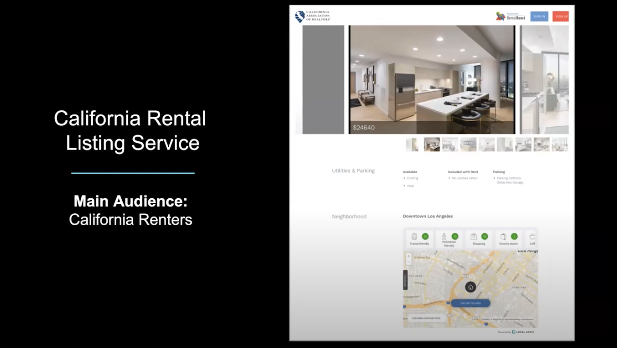
What do location insights do specifically in the rental transaction process as opposed to the consumer residential real estate process?
IG:
I think it’s very similar to what all the other distinguished members of the panel said. This happens to be a $24,000 rental in downtown Los Angeles. I can tell you right now, $24,000 rental, if I told you it’s in the middle of Siberia with access to nothing and you had no context of where it is.
We live in neighborhoods. It’s really important to understand what happens outside the four walls of your residence. Especially with rentals, folks are just significantly less picky about their criteria. You buy a house. It is a very specific and very large purchase for most people. It’s their largest investment.
The reason we even built the consumer portal is because renters search very differently. They want to know, is it convenient for my commute? What are the characteristics of the neighborhood? They’ll consider seven neighborhoods in their search. They’re really not locked in, not nearly as much as on the sales side. And location insights are absolutely critical for them to navigate to the right property.
Similar to Centris, we also take this two-sided approach. Data that comes from the consumer side goes back to the real estate professional and the real estate professional goes back to the consumer. And it’s constantly synchronizing with each other, so everybody’s on the same page.
Can location insights be a standalone solution?
MW:
Thiago has a good question. Can this be standalone? Or, in other words, not integrated with the IDX or RB page. Are you specifically asking about Rental Beast, or are you asking about location insights? Maybe you can answer in the chat.
AW:
I have a feeling I understand the question. The bottom line is we are integrated into a number of website providers, like Constellation and many others, and back-end MLS system providers. But if a broker or an MLS wants to drop it on their page outside of the framework of their provider, it’s no problem.
MW:
Awesome. Thiago says, we have RB coming soon, so we will have that anyway. Their market is in Albuquerque.
IG:
Yeah, in New Mexico. So part of our installation is if we install at the MLS level and then the broker wants to have it at their level, the individual then wants to have at their level. We make it available at every level of the hierarchy.
Increasing traffic and time-on-site
MW:
Any other questions from the audience or anything else that we can do that the panel can answer for you about how this works? We did get one question. Let me throw this to all three of you.
Do you see an actual practical increase in the amount of traffic and/or time-on-site after you’ve installed these types of tools?
EC:
It’s difficult to say. There are so many things that we do around the site that there is definitely some value. People look at it. Where we find it successful is that, because we track the criteria, they use it. So at the end of the day, it’s really the users. We save the criteria and we understand that that’s what the customer wants.
But do we have a specific metric? Maybe Local Logic has it but we don’t. It’s difficult to say actually.
AW:
We just did a study with a large MLS, which asks for a lot of engagement. And I’m happy to speak to this offline to anybody has questions on it. We are now able to track their engagement. It was massive. It was really interesting to me as to which of the insights they spent the most time on and which tools.
So yes, there’s a definite increase in both traffic and engagement. Especially, we do have a product that is geared towards SEO that we haven’t really talked a lot about. There are obviously a lot of other products than the one we’ve kind of primarily focused on, but we do have some products that are primarily written in effect for SEO.
MW:
That’s what I think is really neat about this. It’s providing legitimate information that consumers really want — number one. And information that realtors can provide that makes them smarter and more of a value to their customers — number two. Then you have the added value of it.
If there are things that are creating additional SEO value for the site and helping people stay there longer. All of those things help with your rankings over time.
It just seems like kind of a win-win to me. But I’m kind of a big proponent of MLS websites. Any of you that knows me knows. So not a surprise yeah. So any other questions for anyone? Does anybody else have anything else they want to throw at the audience? If not, I just wanted to give you this.
MW:
So if any of you are interested in learning more about this, go to locallogic.co. Audrey is the VP of Sales and Strategic Partnerships, so she can help you with MLS Websites, Association Websites, broker websites, any portals, and anybody that has an interest in understanding how this type of information might make your web presence and/or your MLS technologies more valuable. She’s your gal.
Last words of advice for MLS
MW:
I don’t see any other questions coming in. So I guess I’ll just ask each of the three of you to close this out. What’s your word of advice on how to take full advantage of this?
Maybe I’ll start with you, Eric, and we’ll just kind of work with the round-robin that we did earlier. What’s your advice on how to get the most out of this?
Share more information
EC:
Bring more. Consumer demand is demanding more. A big trend is everything that has to do with the environment, like flood zones and pollution. So I would say in the future, go with the trend. People don’t always realize that what they want is some orientation. So bring more because that’s what the consumer wants. It’s good for realtors at the end of the day.
Help consumers make better decisions
TD:
I was going to go a similar route. Depth. Depth of your content. The more information you can provide that’s valuable and that allows them to make a quick decision or to be able to get the information they want quickly, the better it is.
And that’s really what Local Logic does. It takes all this data and makes it simple for you to get that piece of information that you need to make it like, “Oh, good, I was looking for that.” Whatever that is. So that’s definitely what I would say is the biggest value along with really just complementing everything else that you have on the site itself to make it a local hub.
Give the consumer what they want
IG:
If it ain’t broke, don’t fix it. I think that they have a tried and true product in the market. And I think the reason it’s so successful is the differentiated content and a lot of care and attention to the user experience. If it’s to give the user what they want and the content is there, you’re going to get a loyal your customer and it’s going to provide value to the membership.
Don’t be afraid to get started
AW:
I would only say these are not astronomically priced products. Walk before you run. This is the last thing you’d expect the Head of Sales and Strategic Partnerships to say, but I’m a big believer that we are only growing our relationships right now with Constellation, Rental Beast, and Centrist. We started in one place.
Don’t be afraid just to get started. Don’t presume that you have to do everything. It’s okay to just put a piece and see how it goes. It’s affordable and it doesn’t break the bank in a hard market. So I’m a big believer in let’s get started and see how it works and if it works for you.
MW:
So Scott says, thanks to each of you, very informative. So thank you panelists.
I think this has been fascinating to hear what you guys are doing to leverage this. And as always a consumer advocate, I’m really appreciative of all of you trying to make the process of buying a home or renting a property less stressful, more informative, and more valuable. And obviously making sure the realtor becomes part of the process is great.
So thanks to all of you. And there are a couple of questions. Yes, this recording will be shared. So if you registered for this today, you will be getting a copy. So feel free to share it. And again, if you need to talk to someone about this, it’s audrey@locallogic.co. Thanks, everybody.

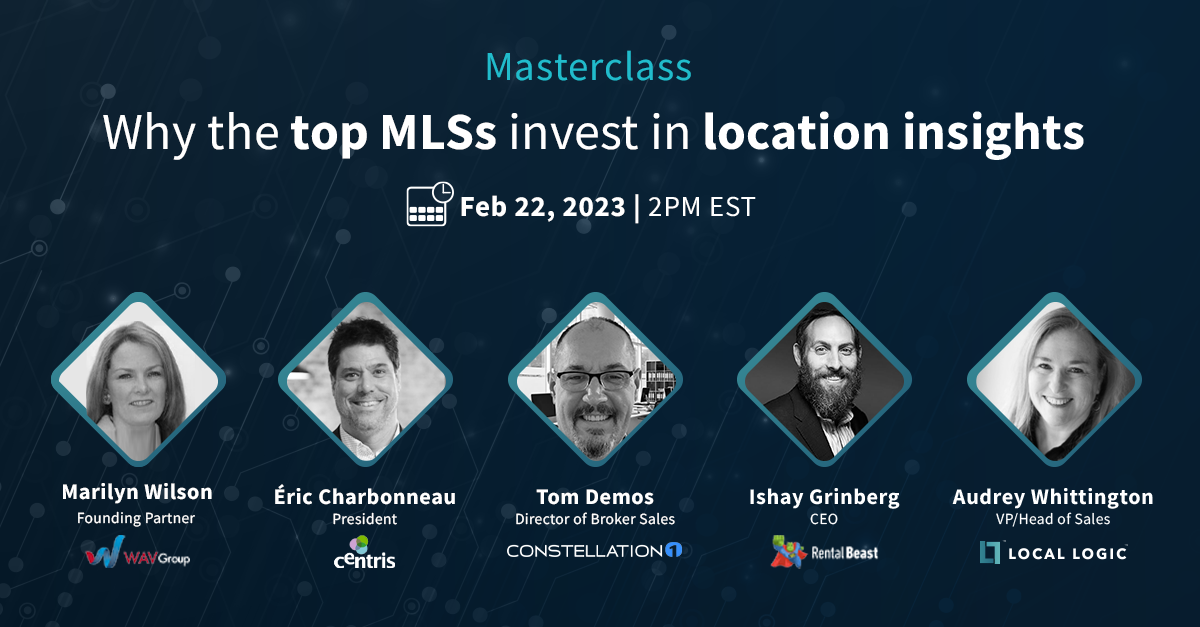
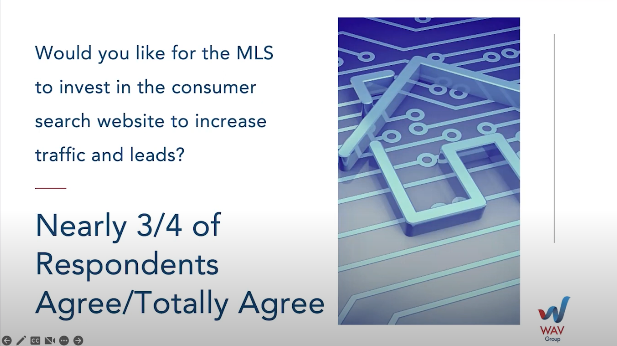 MW:
MW: